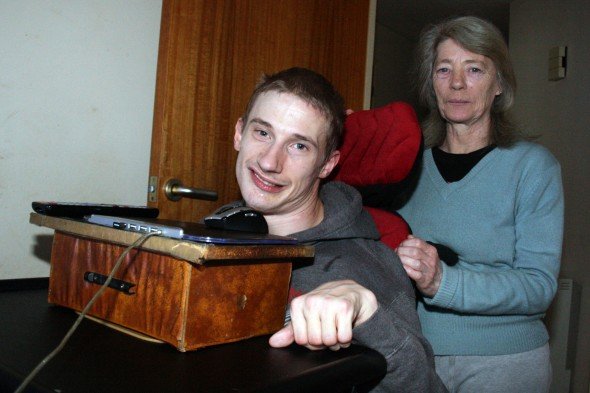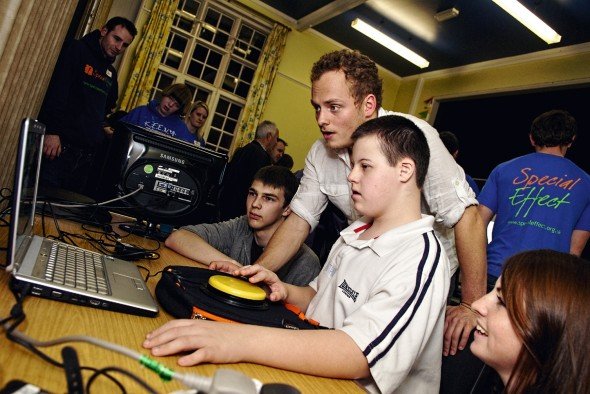Special report: accessibility in games

This article originally appeared in PC Gamer UK 225.
Gareth Garratt is demonstrating to me how he plays Back to the Future. Gareth is a cerebral palsy sufferer, with specific problems regarding motor control. He finds his neck muscles have the best acuity, so Marty McFly is clambering all over the back of a van controlled only by Gareth's chin. The specialised kit that allows this miracle of accessibility? A multi-button Toshiba mouse.
“Developers don't need to do much to let me play,” Gareth says. He's right: they just need to include custom key configuration, so he can move all the controls to the mouse buttons. Of course, his is only one sort of disability and there are an infinite variety of adaptations needed to make a game work for every last person. I ask him whether he expects game developers to cater for all other sorts of disability too? “They could include options in the game menu to make it easier for all kinds of disabilities. If the small companies start doing that, then more people will buy their products and they will grow into bigger companies!”
His enthusiasm makes it sound simple, but there isn't one single thing developers can do that makes their games completely accessible. Some disabilities benefit from just minor changes; others require expensive, custom-made hardware tailored to the individual, which can sometimes be supplied by charities such as the UK's SpecialEffect. Blind gamers can play almost no off-the shelf games; Howard A Sherman, of text adventure developers Get Inside A Story, has found that his titles have attracted a blind community, through text-to-speech. “Our games were never designed or intended for the blind, but we've embraced that community and dedicated resources to properly serve them.”

Compared to that, the deaf are well served: they have no compromises on control systems and games are primarily a visual medium. Excellent sites like www.deafgamers. com rate games on how easy it is to complete them with subtitles and without sound. For example, Runaway: A Twist of Fate, an otherwise solid adventure game, got the lowest possible score because it features several primarily audio-based puzzles.
So how easy is it to take all this on board and develop games that, while not necessarily therapeutic, are at least friendly to a large proportion of the disabled? Nathan Fouts is president of Mommy's Best Games, who are working on the sidescrolling shooter Explosionade for the PC, and who work with US disabled charities One Switch and AbleGamers. “Our games offer complete controller remapping,” says Nathan. “They have the ability to play and run menus with a single button, icons and text for in-game specific prompts, a selection of difficulty settings and a range of gameplay speed options.” The speed changes and button remapping are a hit even with hardcore gamers. “I see the disabled options as helping all gamers,” Nathan says.
At what stage do they start considering disability? “With Explosionade, I supported accessibility options right from the start, as it was a success with Shoot 1UP.”
The biggest gaming news, reviews and hardware deals
Keep up to date with the most important stories and the best deals, as picked by the PC Gamer team.
Some of the most challenging gamers to deal with are stroke survivors, who often have partial paralysis. Dr Sergi Bermúdez i Badia, of the University of Madeira, Portugal, has developed some amazing bespoke technologies to allow them to play. His solution? “Passive exoskeletons (non-powered structures) that, by means of a spring system, help compensate for the weight of the upper limbs of the patients, allowing those with low mobility to perform 3D movements.”

His other devices are just as fascinating. “There's an active robotic device that provides haptic feedback when the patient interacts with virtual environments – particularly beneficial to visually impaired gamers.”
His current research involves an active robot system, which aids the patient in completing movements. This approach is particularly interesting since it reads muscle activity to decode action intent and the robot helps complete the action. But this hardware is prohibitively expensive, so he's also been looking into the more conventional technology, such as PCs, mice and webcams. With these he's already developed Kinect-style bodytracking that reads player movements and translates them in the game.
So while it's disappointing that so much of the kit for the physically disabled is so expensive, there is help available. The relatively new charity SpecialEffect (www.specialeffect.org. uk) specialises in helping gamers with severe disabilities. SpecialEffect's new 'loan library' project has an array of kit people can borrow to see if anything particularly helps them; in the meantime, they recommend free software like Camera Mouse (that allows you to control a mouse using a webcam), CPI Killers (which slows down games) and dwell clickers (which allows someone to use all the different mouse functions without pressing a button).

Of course, sometimes games don't just need to be entertaining – they could benefit the patient too, especially mentally. Howard Sherman says: “If a game's therapeutic qualities can be elegantly weaved into the experience, so that it's camouflaged, that's ideal.”
Dr Bermudez sounds a note of caution though. “The mere act of using games is not enough to claim therapeutic improvements. To be considered a therapy, the game has to be designed following medical and neuroscientific guidelines.”
Casey Wimsatt of Symbionica has taken that on board and developed a series of FaceSay (www.facesay.com) games, which treat the more serious social problems of autism. “Broadly speaking, the games are designed to help kids become aware of the social value of the movements and features of the face,” says Casey. “Attention to the eyes is important for a number of upstream skills, such as emotion recognition and imitation.”
There aren't any hard and fast tips to allow every last person with disabilities to play a game. That said, as Explosionade shows, there are simple things that every developer can do to make games accessible to the majority of gamers. So, why don't the big companies do them?

